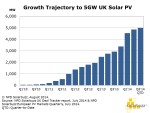Kudos to the UK, but Australians should be asking “what the heck??” regarding that nation outperforming our own for uptake of solar power systems.
Australia has significantly more solar resources and space, but the UK has recently run right past us on solar; slapping the back of our heads on the way through – even after somewhat of a delayed start.
According to NPD Solarbuzz, solar PV capacity in the United Kingdom has reached 5 gigawatts (GW). 90 percent of the total figure has been installed in just the last 3 years.
The UK is now one of only six countries to have joined the 5GW+ club – the others being Germany, China, United States, Italy and Japan.
“At 5 GW, solar PV capacity in the UK can now power nearly 6 percent of all UK households,” says NPD Solarbuzz.
Where there is a major difference between the UK and Australia is segmentation. Residential installations in the UK represent one-third of the 5 GW capacity – so around 1.66GW. In Australia, the bulk of our ~3.4GW capacity are small solar installations.
NPD Solarbuzz expects the UK’s total to continue to grow rapidly until the end of March next year, when policy changes that will slow down the large ground-mounted PV segment take effect.
Vice President of Solarbuzz Finlay Colville has posted a detailed explanation of the hows and whys of the UK’s massive solar growth on Solar Power Portal.
It just goes to show how fast solar can grow when policy settings are favourable, even in often dreary good old Blighty.
Meanwhile; in the land of sun, surf and sand; major renewable energy investment has been somewhat crippled thanks to the drawn out Renewable Energy Target review. The situation has sent some investors packing – and pending the outcome – perhaps to never return.












































